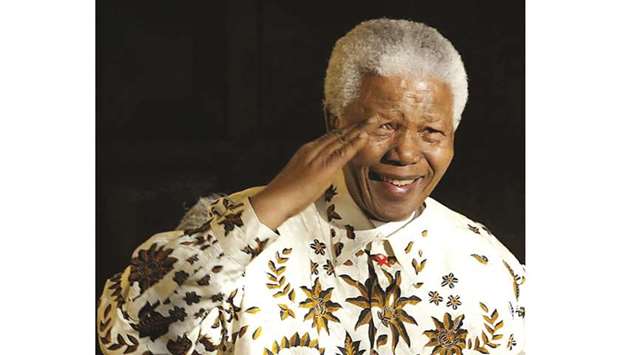Imprisoned for his political activism against South Africa’s racist apartheid system, Mandela’s battle was testament to his courage, resilience, humility, and forgiveness, and it rightly earned him a place in history as ‘the last great liberator of the 20th century’. His detention became the focus of a global campaign, and when he walked free on 2nd February 1990, he had already become synonymous with justice and eradication of racial inequality and the peaceful termination of the apartheid regime.
Mandela became South Africa’s first black president in May 1994. He was the first South African president to be elected democratically. Mandela spent more than five years in office before stepping down in 1999.
In his honour, his birth date of 18th July has been declared “Nelson Mandela International Day.” This is the first time that the UN declared an International Day in honour of a person.
As part of Mandela’s 100th birthday, the world is remembering the world-famous revolutionary leader in a myriad ways, from musical tributes and gala dinners to rousing exhibitions and events. The South African Reserve Bank launched its first commemorative banknote series. The larger than normal notes depict Mandela’s historical journey from his birthplace to his last days. Big corporate have found their own way to appeal to a global audience. Philips South Africa’s Shave to Remember campaign (#ShaveToRemember) calls on people to honour the values embodied by the shining beacon by wearing his haircut.
Mandela popularised the ‘Madiba shirt,’ a traditional silk shirt typically with a colourful print. And his favourite food was tripe, the stomach lining of farm animals like cows and sheep. A lifelong fan of Indian food, his first meal after being released from prison was chicken curry.
“I learned that courage was not the absence of fear, but the triumph over it,” he mentioned in his autobiography, Long Walk to Freedom. “It always seems impossible until it’s done” is also attributed to him. Five years on from his death, Mandela’s life, pithy quotes and inspirational speeches offer a guide to ensuring a life well lived. And Madiba continues to be a source of inspiration for those who want to change the world in the face of injustice and adversity.
Welcome to the world of ‘Nutty’s Infotainment. YAYS!’
Your time starts NOW!
What’s in a name? His birth name was ‘Rolihlahla’. His most famous first name was given to him by his teacher, as it was customary to have an English name so colonial masters could pronounce easily. He has also known by names like ‘Tata’, ‘Khulu’ and ‘Dalibhunga’. Name him.
Nelson Mandela. He was named Nelson by his teacher.
Before tying the knot with Mandela on his 80th birthday, she was married to the President of another country. Her marriage to Mandela after her husband’s death means she has been the first lady of two nations. Name her.
Samora Machel. She was earlier married to then President of Mozambique.
What sport traditionally uses goose feathers of the left wing?
Badminton
Which is the only sign of the Zodiac to be represented by an inanimate object?
Libra, which is represented by scales.
A Scientific American article in 1867 described this newly-invented gadget as a ‘literary piano’. The last of these are now heading to museums. What are these?
Typewriters
How did Apollo 11 astronauts manage their life insurance, as they couldn’t afford life insurance policy?
Before the mission in July 1969, all three astronauts signed hundreds of autographs (known as Apollo insurance covers) and sent them to a friend. If anything was to happen to them, the entrusted friend was to send the autographed memorabilia to each of the astronaut’s families. This way they could make some money by selling the signatures of the Apollo 11 crew.
Its construction started in 1891 and the first phase was completed on 21st July, 1904. Spanning an incredible 9,288 kilometres, it passes through 87 cities and towns and crosses over 16 rivers. From start to finish it passes through eight different time zones. What is this?
The Trans-Siberian Railway
As per ‘The iceberg theory’ of the style of writing, the deeper meaning of a story should not be evident on the surface, but should shine through implicitly. Which American novelist coined this theory?
Ernest Hemingway
The lowest natural temperature ever directly recorded at ground level on Earth was 25 years back on 21st July. What was the recorded temperature?
−89.2 °C (−128.6 °F) recorded at Soviet Vostok Station, Antarctica.
Name the artist of the below work, ‘The Cell’ from 2002?
(Answer next week. Answer to last week’s photo quiz: Colosseum, Rome)

